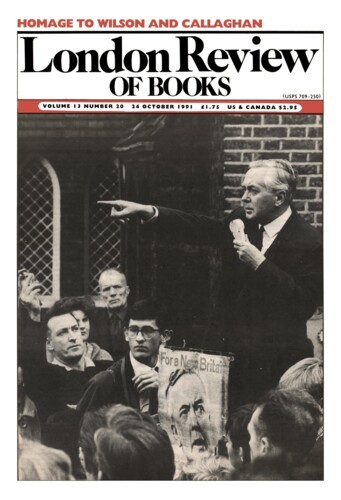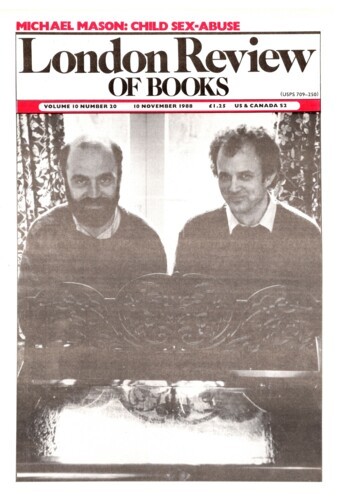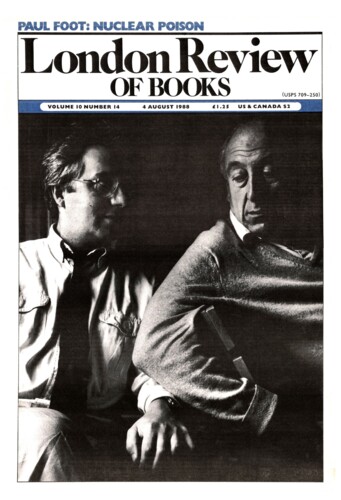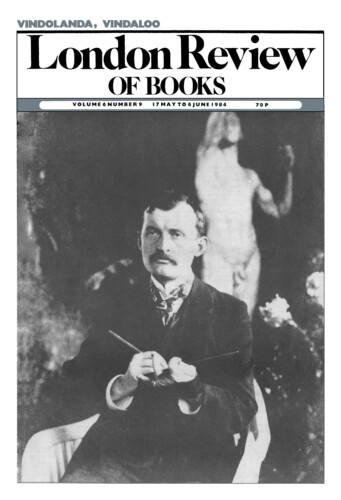Francis Wyndham
Francis Wyndham first book of short stories, Out of the War, was published in 1975. He is at present working on a second collection. On 18 November, Virago are publishing three of Ada Leverson’s novels – Love’s Shadow, Tenterhooks and Love at Second Sight – in one volume, entitled The Little Ottleys.
Diary: At the Theatre
Francis Wyndham, 10 November 1988
At a friend’s house, I saw a video of Liebelei, Max Ophuls’s beautiful film of Arthur Schnitzler’s play which was shown on television some months ago. Made in 1932, this masterpiece is a rarity: although the Third Reich censors removed Ophuls’s name from the credits and he left Germany on the day after the Reichstag fire, it was banned by the Allied Commission when the war was over because its success had happened to coincide with the Nazi regime. It begins behind the scenes at the Vienna Opera House. The first act of The Abduction from the Seraglio has just ended: the stage manager anxiously looks out through a peephole in the curtain to survey the crowded stalls and balconies. We share his view – the spectators are now being spied on. Then, the chandelier in the auditorium flares alight to herald the arrival of the Emperor; the audience rise, turn their backs on the stage and gaze up at the Royal Box. Very subtly – almost subliminally – Ophuls has adumbrated a mystery central to drama: who is being watched, and by whom?’
Francis Wyndham talks about himself to Alan Hollinghurst
Francis Wyndham, 4 August 1988
I was thinking about the unusual shape of your career as an author – having written a collection of stories during the war when you were in your late teens and not published them for thirty years, then later publishing two books, one of which is almost entirely about the period of the war. The war seems to be a magnetic subject in what you’ve written. I wondered what sort of war you’d had.’
Story: ‘Eating Alone’
Francis Wyndham, 17 May 1984
Sometimes, when I am alone in the evenings and feel like giving myself a treat, I go to a little restaurant round the corner called the Star of Bombay. An old newspaper cutting is displayed in its window containing a guarded recommendation by Fay Maschler, but in spite of this the place is nearly always empty. Occasionally a transient figure may appear, swiftly and rather furtively, to carry off a take-away ordered earlier by telephone. Two young Indian waiters in dinner jackets hover apprehensively at the back of the room, while behind and above them, seated on a raised platform, a somewhat older Indian lady regally presides. To an impressionable customer, she can suggest both the motherly authority of Indira Gandhi and the unbridled licence of erotic Hindu art.
Story: ‘The Ground Hostess’
Francis Wyndham, 1 April 1983
The telephone rang. It had to be Hurricane Harriet.
Pieces about Francis Wyndham in the LRB
Silly Buggers
James Fox, 7 March 1991
I first met Francis Wyndham in 1968, when I went to the Sunday Times Magazine looking for a job. A thunderstorm in the Gray’s Inn Road had soaked my cheap lightweight blue suit, bought in...
Kay Demarest’s War
Penelope Fitzgerald, 17 September 1987
In The Other Garden Francis Wyndham manages a classic form, the first-person novella, with great delicacy and originality. His first person, as in his collection of short stories Mrs Henderson,...
Complaining about reviews
John Bayley, 23 May 1985
Few things are easier to recognise or harder to define than the way humour works in art. It is only incidentally to do with making us laugh. Being funny is a methodical process and a localising...
All I can do
Carole Angier, 21 June 1984
Jean Rhys always said, and certainly believed, that she didn’t want to be a writer. She only wrote, she said, because she was unhappy, and when she was happy, as she was in her twenty years...
Read anywhere with the London Review of Books app, available now from the App Store for Apple devices, Google Play for Android devices and Amazon for your Kindle Fire.
Sign up to our newsletter
For highlights from the latest issue, our archive and the blog, as well as news, events and exclusive promotions.





